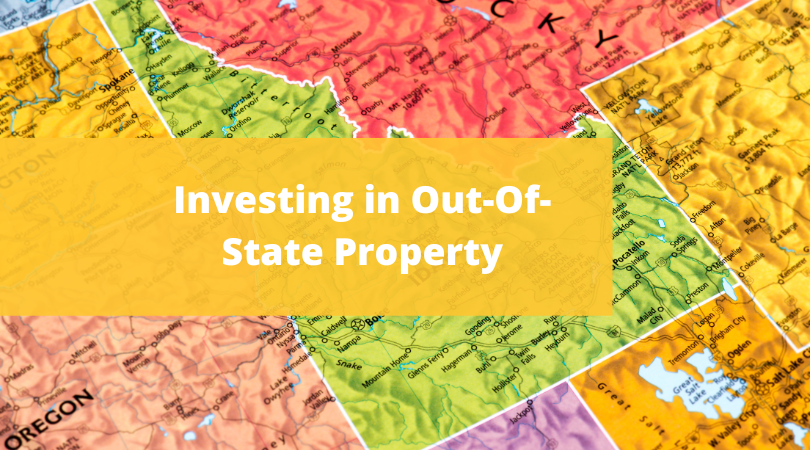
Have you ever considered the benefits of diversifying your investments by stepping beyond your local real estate market?
Venturing into out-of-state property investment can be a game-changer for landlords looking to expand their portfolio and increase their revenue. This strategy opens a world of opportunities, potentially offering higher returns, access to different economic dynamics, and a hedge against local market fluctuations.
This article aims to guide landlords through the ins and outs of investing in out-of-state properties. We’ll cover key considerations, strategies for success, and how to overcome common challenges to help you make informed decisions and maximize your investment potential.
Essential Considerations For Out of State Property
Investing in property outside of your local area requires careful planning. Here’s an expanded look at what you need to consider:
Market Research
Thoroughly understanding the market dynamics of the area where you plan to invest is crucial. This involves studying the local economy, employment rates, demographic trends, and real estate market conditions.
It’s not just about finding a property at a good price; it’s about ensuring the area has potential for growth, stability, or any other qualities you’re searching for.
Real Estate Laws
Different states have different laws regarding landlord responsibilities, renter rights, property taxes, and real estate transactions. Familiarize yourself with these to avoid legal pitfalls.

Owning property in another state can complicate your taxes, as you may be subject to state income taxes both there and where you’re primarily located. Make sure to do your research on your states and don’t overlook any crucial tax implications.
Building a Local Support System
Since you won’t be physically present, having a reliable local team is vital. This includes a trustworthy real estate agent who understands your investment goals, a competent property manager, a responsive maintenance crew, and a knowledgeable local attorney.
These professionals will be your eyes and ears on the ground and can provide valuable assistance when it comes to managing your property effectively.
Assessing Property Management Options
A good property management company can make or break your out-of-state investment. They should handle everything from marketing your rental, vetting applicants, and collecting rent, to handling maintenance issues and legal matters or even performing renewal screening checks while you’re away.
Ask them the right questions. Ensure that they have a good track record and that they understand your expectations.
Understanding the Rental Market
If your investment strategy involves renting out the property, understanding the local rental market is essential. This includes knowing the average rent prices, renter demographics, vacancy rates, and rental property demand in the area.
This information will help you set competitive rent prices and target the right renter demographic.
Financing and Insurance Considerations
Securing financing for an out-of-state property can be more challenging than for a local one. Lenders may have stricter requirements or higher interest rates for out-of-state investors.
Additionally, ensure you have the right type of insurance coverage for your property, as requirements and risks can vary significantly from one location to another.

Exit Strategy and Long-Term Goals
Have a clear understanding of your long-term investment goals and an exit strategy. Whether you plan to hold onto the property for its rental income, wait for its value to appreciate before selling, or have any other goals, having a well-defined plan will guide your investment decisions and keep you on a successful path.
Personal Commitment and Involvement
Investing in out-of-state property requires a commitment of time and resources. Be prepared for unexpected issues and the need for occasional personal visits to the property. This will be easier if you’ve already committed to being a full-time landlord.
While a property manager will handle day-to-day operations, your oversight and involvement in major decisions will be critical to the success of your investment.
Risk Assessment and Contingency Planning
Understand the risks involved, such as market fluctuations, property damage, or periods of vacancy. Have contingency plans in place to handle these risks, including financial buffers or insurance strategies.
Regular Property Evaluation
Regularly assess the performance of your property against your investment goals. This includes reviewing financial statements, checking on property conditions, and staying informed about local market trends.
This ongoing evaluation will help you make informed decisions about whether to hold, sell, or make changes to your investment strategy.
Pre-Purchase Strategies for Out-of-State Properties
Before finalizing your out-of-state property investment, it’s crucial to have a strategic approach in place. Let’s take a look at pre-purchase strategies to ensure that your investment is well-informed, secure, and aligned with your long-term goals.

Never Skip the Physical Inspection
It’s crucial to visit and inspect the property personally, as online information can sometimes be misleading or incomplete. A professional inspection is also a must to avoid inheriting expensive, time-consuming problems.
Securing Reliable Residents and Financial Preparation
For long-distance landlords, finding trustworthy residents is critical. Additionally, it’s advisable to get pre-approved for a mortgage in the property’s locale, which can expedite the purchasing process.
The Added Risk for First-Time Property Owners
If you’re a first-time property owner, buying out-of-state adds an extra layer of risk. There’s no real substitute for hands-on experience in property management.
Maximizing Success in Out-of-State Property Investments
Choose Familiar Territories
Buying property in an area you know well can provide an advantage. This familiarity can also make your leisure travel partially tax-deductible, as it adds a business component to your trips.
Adopt a Smart Buying Strategy
An important factor in real estate investing is knowing where to do it. Choose properties in neighborhoods similar to your own to leverage your existing knowledge. Avoid high-risk properties and focus on areas with a solid owner-occupancy rate to attract stable residents.
Frequently Asked Questions
Let’s take a look at some frequently asked questions related to out of state property investment:
How Do I Begin as an Out-of-State Investor?
Start by identifying and working with a reliable property management company, then focus on finding, inspecting, and purchasing the right property.

Which States Offer the Best ROI for Real Estate?
The top states for real estate ROI can vary, but popular options include Arizona, Florida, Maryland, and Delaware.
Which State Is Ideal for Maximizing Real Estate Profits?
This all depends on your budget, investment preferences, and management style. Each state offers unique opportunities and challenges.
Conclusion
Investing in out-of-state property offers exciting opportunities but comes with a unique set of challenges. With careful planning, thorough research, and the right support network, you can navigate these waters successfully.
A key component of this success is partnering with a reliable property management company. This is where Five Star Property Management comes in!
Our dedicated team can significantly streamline your investment journey, ensuring peace of mind and maximizing your property’s potential.
Embark on your out-of-state property investment journey with confidence, backed by the trusted support of Five Star Property Management.
